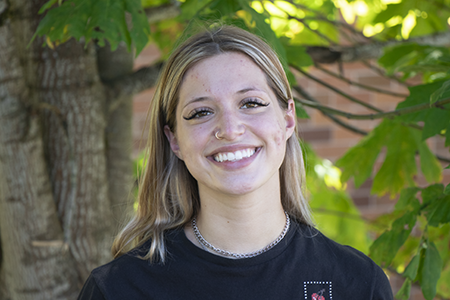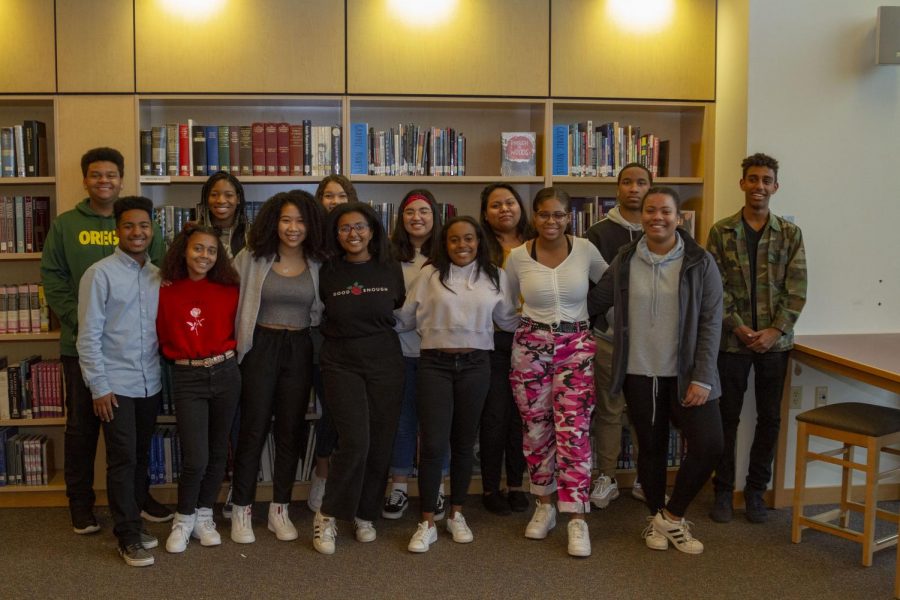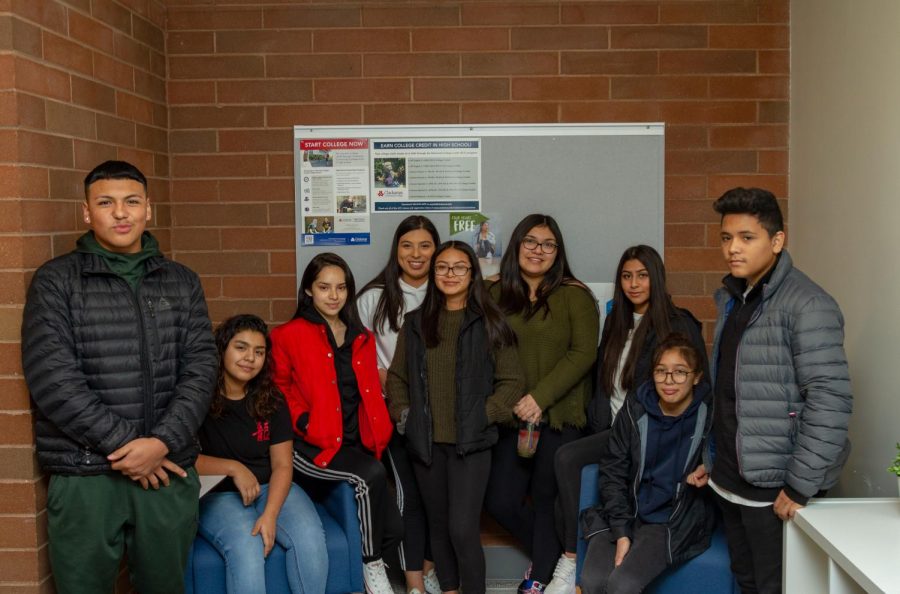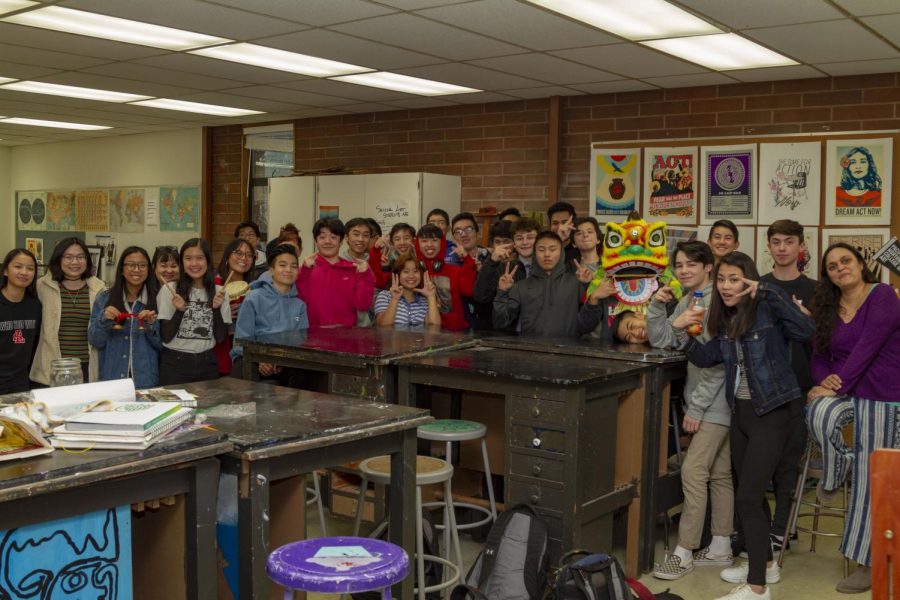
Maya is a senior at La Salle. She is on the varsity tennis team. Outside of school, she loves listening to music, hanging out with friends and family,...


January 23, 2019
Working towards spreading awareness, diversity, and comfort for all students throughout La Salle, three new affinity groups have been active this school year: the Black Student Union, Unidos en Poder club, and Asian/Pacific Islander club.
These new groups coincide with an effort by the school administration to push for more equity and inclusion. In hopes of doing so, Vice Principal of Student Life Mr. Brian Devine and Vice Principal of Curriculum and Professional Development, Mrs. Alanna O’Brien engaged in a yearlong program last school year, through the Center for Equity and Inclusion.
“One of the things we did as a result of that work was to meet with students, and really spend time with students of color to find out what they need in their school community, what was missing for them, and what would be something that would benefit them,” Mr. Devine said. “One of the things we heard from students is they felt like they needed a space that was a safe space where they could have conversations, and just be in community with people that come from similar backgrounds, and could share that experience with them.”

The affinity groups are mainly student-run, but have an adult moderator that supports them. “Mr. Snow has been advising the [BSU], and supporting them as they prepare for some Black History Month activities [in February],” Mr. Devine said. “But [most] of the initiative is being student led for sure.”
A few years ago, La Salle had a multicultural union group. According to Mr. Devine, “it encompassed a lot of students of color, and I think for those students it was a really positive experience, but it felt a little bit limited,” he said. “You had students who were coming from different experiences, and the one similar factor that they had, was that they felt like maybe their voices weren’t being heard, or their experiences weren’t being centered.”
However, he added, “there are also lots of differences within those groups so I’m grateful that we are providing space for specific affinity groups that can collaborate together around issues that relate to multiculturalism, but that also are able to celebrate their own unique identities, and their own unique experiences,” Mr. Devine said.
Black Student Union (BSU)

The Black Student Union is run by juniors Amira Tripp-Folsom and Mary Gach, with staff moderator, Vice Principal of Student Life Mr. Devine.
“Freshman year, I was really looking forward to having a BSU,” Tripp-Folsom said. “When [I] shadowed [at] St. Mary’s, they had a BSU, so I kind of assumed that La Salle would have one, but they didn’t.”
“I talked a lot with Mary, freshman and sophomore year,” Tripp-Folsom said. “We really wanted something having to do with race. [We worked] with Mr. Devine and Mrs. O’Brien. Then we just decided that the Black Student Union is what’s needed most right now.”
A pivotal moment to spur the creation of the BSU was the assembly last March that focused on equity. Several members of the school community spoke about their experiences having to do with race and ethnicity.
“It was a bunch of people of color who [gave] speeches, and [it was] realizing that even though we are different races, we are all people of color,” Gach said. “Just having something that unifies us, was a turning point, like let’s make this happen… because of that, [we] realized that a lot of people are actually for this. So that made it a lot easier.”
The group meets either every other week, or once every three weeks, and they host many discussions “on what it is like to be black, and different things surrounding that,” Tripp-Folsom said. “[We also talk about] being too black, or not being black enough, and what the divide is there.”
“Right now I think we’re in the process of still getting to know each other,” Gach said. “[We’re] making sure everyone’s on board, that we do endure the same struggles a lot of us go through, and we have some similarities. We’re [just trying to get] people comfortable to share what it is like to be black, or a person of color.”
The BSU is open to people who aren’t black, but “we do have specific meetings that are just for black students,” Tripp-Folsom said. “We really want to work on building a safe space specifically for black students, because that is not common at all [here at] La Salle.”
“The most challenging thing for me is being too black or not black enough,” Gach said. “Going to a predominately white school, [it makes me feel] a lot of the time [that] I would offend people by being too black, because it’s not what they’re used to.”
“I think definitely being black in a majority of white space, you deal with a lot of ignorance,” Tripp-Folsom said. “It’s like a day-to-day… just little things. [You] know when it’s happening, and you learn how to deal with it. I think that’s why the BSU is really important because you shouldn’t let all those little things build up [within yourself], and you should definitely talk to people about it, and more importantly, people who can relate.”
The BSU is trying to focus on both positive and negative topics. “I feel like the BSU really emphasizes learning to appreciate your blackness,” Gach said. “Not just addressing the negative issues around police brutality and stuff like that, but also finding that self-appreciation of who you are as a person, even though there’s not many people who look like you. I think just giving people that self-approval, that you are amazing, [is important].”
If you are interested in trying to get involved in the BSU, contact one of the club leader: Amira Tripp-Folsom and Mary Gach, or the staff moderator: Mr. Devine, at [email protected].
Unidos en Poder

The idea to create the Unidos en Poder club came from senior Emily Harding, who now runs it with senior Leslie Bojorquez-Quintero, and the staff moderator, counselor Ms. Mendez. Emily constructed the club to be a safe space for Hispanic and Latino students to embrace who they are. “There’s been a lot of stuff lately in social media, and within schools,” Harding said. “There’s things that go around and shouldn’t be, and I [feel the club will be able to] spread awareness.”
“In high school, there’s a lot of hard times where people [don’t] know who they are,” Harding said. “They’re very insecure about themselves, and I think that happens a lot based on people’s skin tone. I thought making this club would help us embrace who we are, really [being] proud of where we come from, and spread the love.”
“After the [equity] assembly last year, we weren’t [fully satisfied] with the results,” Bojorquez-Quintero said. “Our main goal is just to be heard, and actually listened to; and that’s why we made the club.”
The Unidos en Poder club meets every other week, but is in the works of beginning to meet every week. In the club, “we do arts and crafts,” said Harding. “We [hid] piñatas [around the school] to spread awareness of Hispanic Heritage Month. We [also] watch movies.”
“We do have long-term goals,” said Bojorquez-Quintero. “But right now we’re trying to focus on being comfortable with each other, and allowing others to know we’re here for them.”
Some of the goals the group has are “for the club to be up and running next year and the years coming after that, and for Latino people to be more involved in the school as well,” Bojorquez-Quintero said. Harding added, “And for [Latinos] to feel like they belong… that’s like our main goal.”
“[Our club creates] that open space for everyone to feel comfortable in, when there’s a lot of white people here [at La Salle],” said Harding. “A lot of times in classrooms there’s only white people, and then you’re the only colored person. Sometimes you [kind of] need a break, [to] just talk with people about it, and understand that everyone [is] feeling that way.”
Bojorquez-Quintero explains why it’s important to have a club that lets people feel comfortable with who they are. “It’s a really hard feeling to describe; this is a whole other level of feeling left out,” she said.
“It’s not necessarily people are ignoring you, it’s just feeling like you’re being ignored.” Harding said, “and that’s what we’re trying to prevent [with our club.]”
The Unidos en Poder club is also working to not label each other’s identities. “We don’t only have Mexicans,” said Bojorquez-Quintero. “Some of us are half Mexican, and half another [ethnicity]. We don’t want to erase either part of that, and we want them to feel just as included as people that are 100% Latino.”
“Being biracial is also really important, and being able to be proud of your uniqueness,” Harding said.
As far as how La Salle could improve the experience for students from diverse backgrounds, Bojorquez-Quintero believes the biggest thing would be starting with teachers. “Teachers go a really, really long way for students,” she said. “I know [they have] for me. All my life I’ve always had some type of ethnic teacher, and now here I can only name [about] two [teachers] that aren’t white. I think it’s [kind of] sad, because everyone wants that teacher that you can relate to on a [personal] level.”
Harding and Bojorquez-Quintero said that they are trying to include everyone who wishes to get involved. “We really want to let people know that it’s not only a club for Latinos. We’re open to everyone. We really love focusing on our goals, but if other people [are] involved too, then that would make us more successful,” Leslie said. “And I think getting other people’s perspectives [helps, too],” Harding added.
To get involved with the Unidos en Poder club, contact one of the student leaders: Emily Harding and Leslie Bojorquez-Quintero, or the staff moderator: Ms. Mendez, at [email protected].
Asian/Pacific Islander Club (API)

Run by juniors Hanna Nguyen and Alison Paguio, sophomore Danny Nguyen, and the staff moderator, counselor and social studies teacher Ms. Kelvin, the Asian/Pacific Islander Club is looking to include everyone in learning about their culture. Hanna created the club, then asked Alison and Danny to help her lead, and develop the API.
“You don’t have to be Asian to [join], you just have to [have a] sense of pride, [joy, or an interest in the culture,]” Danny Nguyen said. “We wanted to make a club that really represents who we are, [because] there’s not a lot of representation [at school] for being Asian.”
There have only been a few club meetings so far and potlucks have been held on some Fridays. Danny Nguyen said, “This is sort of like our trial year, but we want to do a lot more [activities] like [making] bubble tea and sushi.”
Recently, the club began posting discussion forums. “[We] talk about what it means to be who we are in America,” Danny Nguyen said. “Unfortunately here at La Salle, there’s not a lot of Asian people, so talking about this sort of thing is really difficult. It’s hard to open up.”
During the club meetings, Danny Nguyen has noticed, “a lot of people who I see [that] are Asian in our club, really take a sense of pride in their culture, and I think that’s really amazing” He said.
Going to a predominantly white school, “there’s a lot of stereotypes around being Asian, like food, and [being] really smart, [being] good at math,” Danny Nguyen said. “[Maybe] those things are true [for some of us], but it’s hard to show people that we aren’t [necessarily] all those things we are stereotyped as.”
If you’re interested in learning more about Asian and Pacific Islander culture, stop by one of their club meetings. “[The club] brings a sense of knowledge and understanding to people,” Danny Nguyen said. “[For] the people who don’t know what it means, they can understand the reasoning of why it happens, and be like, ‘That’s kind of cool.’ I think it’s that sort of thing that brings comfort to people who don’t know, and people who do know [the culture]. It brings comfort to know that there are other people like you.”
To find out more about the API, or get involved, contact one of the student leader: Hanna Nguyen, Alison Paguio, and Danny Nguyen, or the staff moderator: Ms. Kelvin, at [email protected].
Correction: Jan. 24, 2019
An earlier version of this article misstated the name of one of the new affinity groups. It is Unidos en Poder, not Unidos en Ponder.

Maya is a senior at La Salle. She is on the varsity tennis team. Outside of school, she loves listening to music, hanging out with friends and family,...